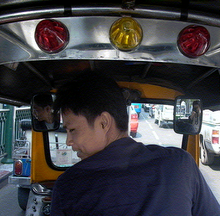Happy quadruple one! I have resolved to start blogging again this year, to outlet experiences, thoughts, reflections, hopes, expectations along my personal and professional journeys through life, and to channel them through writing, which had hopefully reached its all-time low productivity in 2010.
I did try putting matters into words, but it was awfully difficult, not because of a writer’s block, but more as an outcome of – what dawned on me while reading Aronowitz’ “Against Schooling” – the lack of time and space to create. 2010 was a busy year, as I plunged into what was then a new job: developing and managing quality improvement program for schools in remote parts of Sumatra. Between overutilization of my finite time and limited brain power and underutilization of my best skills, I was mostly left exhausted and uninspired on weekday nights and weekends. “We are all so busy doing things that we never have time for thinking,” summarizes Aronowitz (2008: 58) in a chapter entitled “The World Turned Upside Down – Again” in the previously quoted book.
In this brilliant less-than-eight pages short essay, Aronowitz starts by highlighting the problems of the globalized world – from millions of displaced people unabsorbed by available employments, the availability of less fulfilling jobs despite supposedly better skilled and more intellectual labors, the requirement of lifelong learning as a result of insecure employments, and the strengthening and overpowering of capitalism on almost all public domains. He argues that the need to provide and create alternatives to globalization as a hegemonic system (and other hegemonic systems for that matter) is unfortunately unaddressed in schools: the need to gain self-knowledge vis-a-vis the world-at-large, to know the histories of the self and of humankind, and to have the time and the space to reflect, to invent and to create.
Let’s carve out the time and the space it takes in 2011 to reflect, to invent and to create, in order to find “what the alternatives are to simply accepting things as if they were natural (Aronowitz, 2008: 57).”
Subscribe to:
Post Comments (Atom)




No comments:
Post a Comment